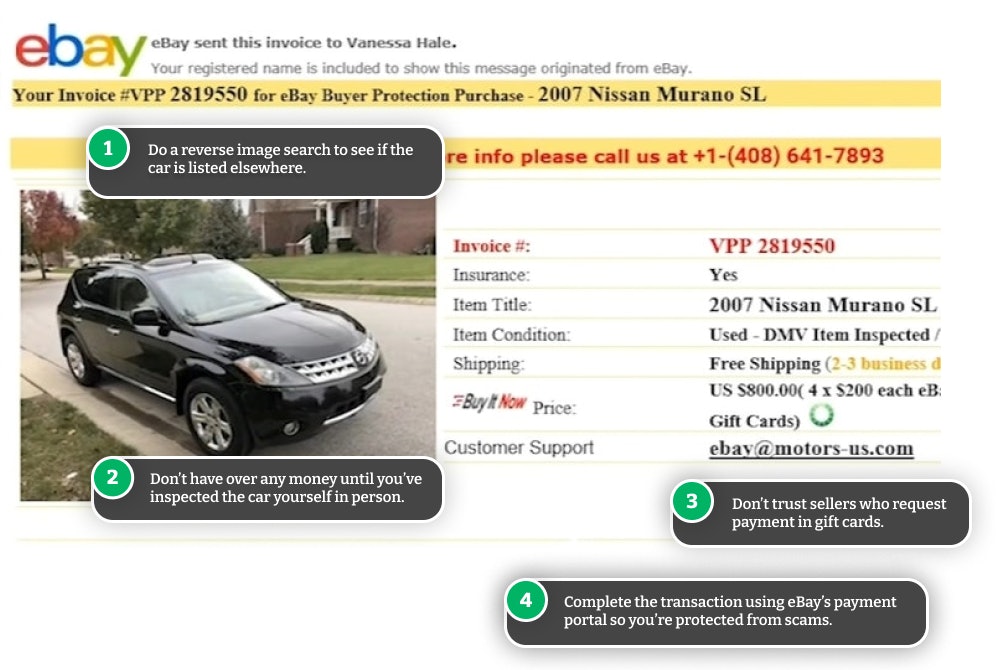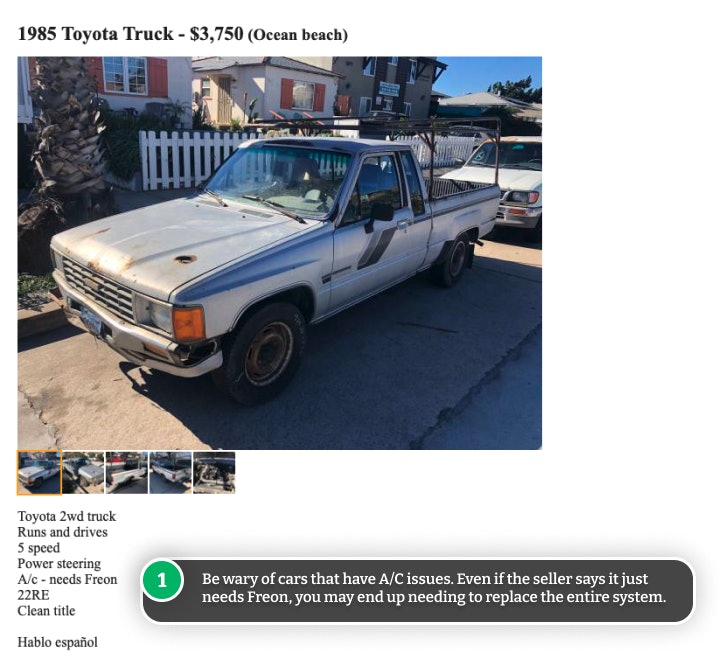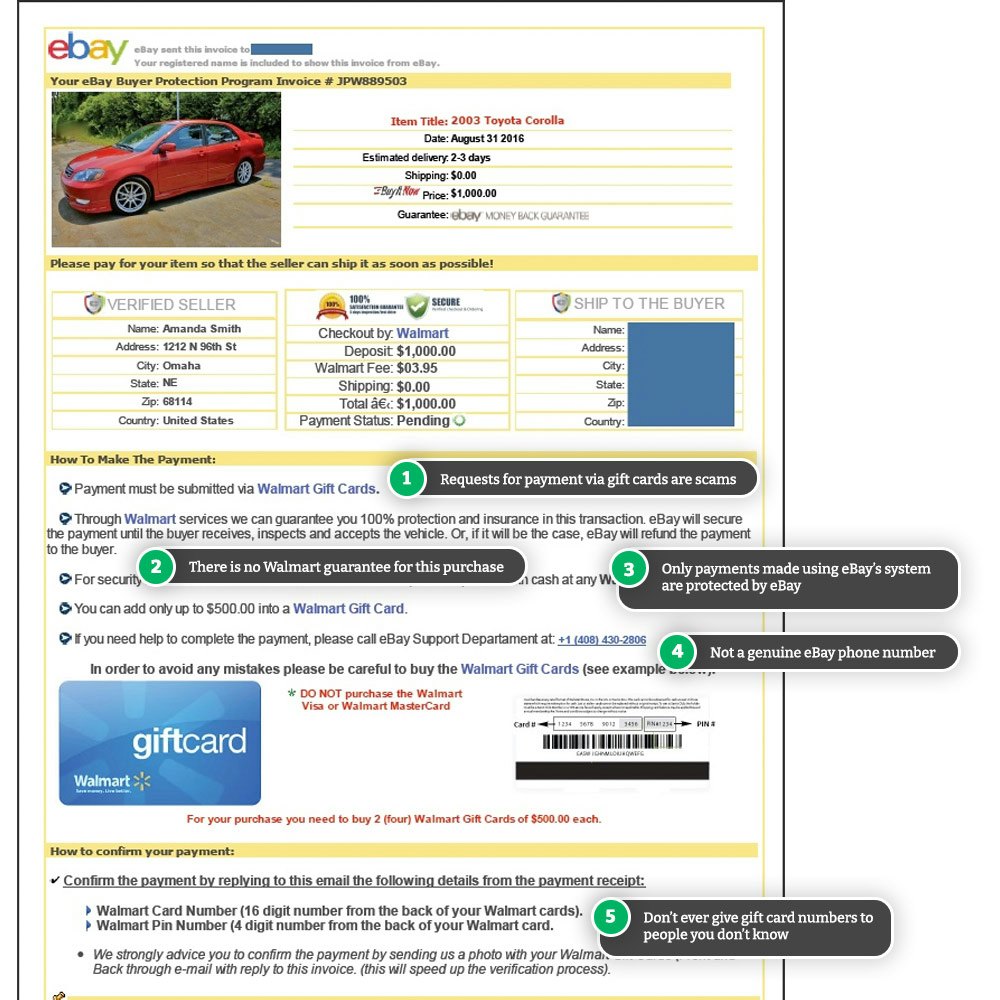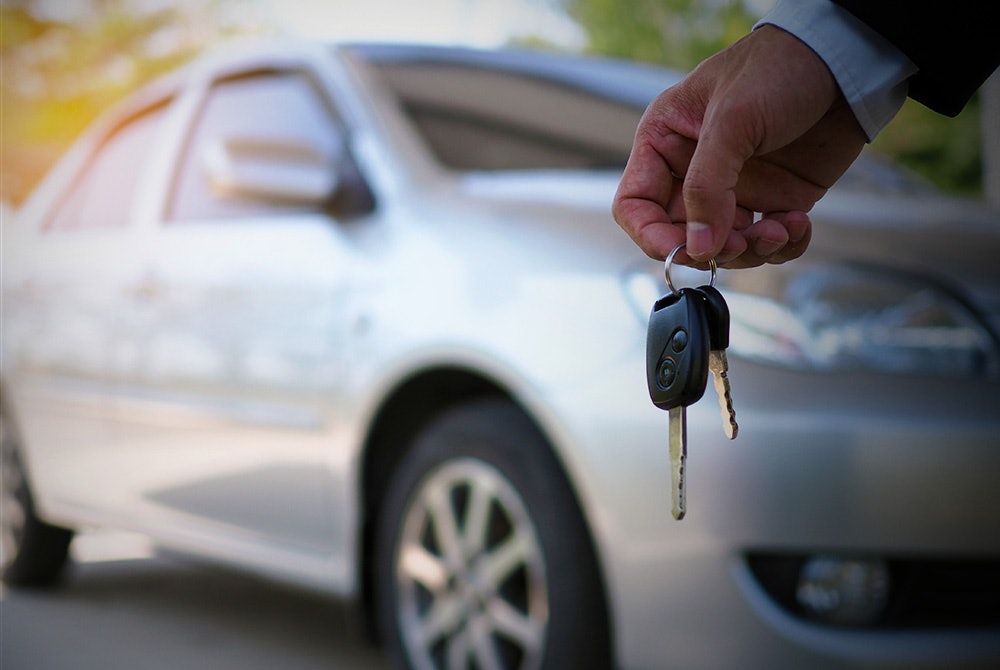- Fake Vehicle Used Car Scams
- Stolen Vehicle Sale
- Odometer Fraud
- Broken Air Conditioner
- Fake Purchase Protection for Used Car Sales
- Title Washing Used Car Scams
- Best Practices When Buying Used Cars
- What to Do If You Fall Victim to Used Car Scams
Buying used cars has never been easier. Several online platforms like Craigslist, eBay Motors, and OfferUp allow private sellers to post their vehicles up for sale, bypassing the need to go to a dealership. However, with convenience comes vulnerability—it's not uncommon to come across used car scams when shopping online. When hunting for a used car, look out for red flags of fraud and make sure you take several precautions before handing over any money.
Scams involving the sale of used cars can come in different forms. While the script may change depending on the scam, the end goal is always the same—to steal your money. Here are some of the most common used car scams to be aware of.
Verify the VIN
When buying a used car, a critical step is to verify the vehicle identification number (VIN) and obtain a vehicle history report.
Fake Vehicle Used Car Scams
You find a used car at a reasonable price on a site like Craigslist or Facebook Marketplace and contact the seller to inspect the vehicle. The seller will be unable to show you the car—they might say they're out of town or the car is out of state—whatever the reason, you won't be able to see the vehicle in person.
The seller will push you into buying the car, maybe by lowering the price or saying other buyers are interested. They'll ask for payment via wire transfer, gift cards, or other untraceable—and somewhat suspicious—methods and promise to have the car shipped to you upon payment. Once you send payment, the seller (i.e., scammer) will disappear with your money, and you'll never get your car.

Protect Yourself from Fake Used Car Scams
To avoid falling for a fake vehicle scam, you should look for red flags and cancel the transaction if you notice anything suspicious. Red flags include:
- The seller's inability to show you the car in person
- The seller's inability to meet you in person
- A price that seems too good to be true
- A pushy seller
- Request for payment via non-traceable methods
- A seller who won't provide a vehicle identification number (VIN)
Scammers Use Fake Photos
Do a reverse image search on the vehicle to see if the seller just stole a photo from another site or listing.
Stolen Vehicle Sale
In this used car scam, you find a vehicle online being sold at a great price and in good condition. The seller allows you to inspect the car in person, likely in a public area. If you ask for the vehicle identification number (VIN) so you can run a vehicle history report, the seller will either give you a fake VIN or offer to send you the vehicle history report, so you don't need to pay for one yourself.
The report will look fine with no red flags, so you send money to the seller and pick up your used car. However, when you try to transfer ownership of the vehicle at the DMV, you'll realize the vehicle has been reported stolen, and it will be taken off you.
Avoid Buying Stolen Vehicles
To avoid buying a stolen vehicle, it's critical that you get the VIN by looking at the car itself (scammers may give you a fake one) and get your own vehicle history report. If the seller offers to provide you with a vehicle history report, you should still pay for your own, as they could send you a fake report or one for a different car.
Where to Find the VIN
The location of the VIN on the car will depend on the make and model. The most common places to find the VIN are on the driver's side of the dashboard or the driver's side door jamb.
Odometer Fraud
Odometer fraud is widespread, with almost half a million used cars sold each year having their odometers tampered with. This more advanced used car scam works by the seller turning back their odometers on their vehicle to give it more value—the less mileage, the higher the sale price.
While digital odometers are harder to manipulate, it is possible if you know what you're doing. Tampering with a car's odometer reading is a federal offense, but scammers don't care about that—they will sell you the car with fake mileage then play dumb if they get caught.
How to Spot Odometer Fraud Before Buying
It's generally not immediately apparent when a car has had the odometer reading rolled back, but there are some things to pay attention to that can uncover tampered mileage:
- Do the numbers line up correctly? This is easier to spot on mechanical odometers found on older cars. If the numbers (except for the last digit) don't line up exactly, it's a sign of tampering.
- Check the interior of the car. Pay attention to everything from the seats, seat belts, buttons, and pedals, checking if the odometer reading matches the wear and tear of the vehicle. For example, a car with low mileage certainly won't have faded control buttons or a deteriorated steering wheel.
- Check the exterior of the car. If the vehicle legitimately has low mileage, there should be minimal scratches, dents, and cracks in the windshield.
Broken Air Conditioner
Many sellers will try to trick you into buying a car that has a broken air conditioner which can cost thousands to fix/replace. Common wording that scammers use is "Just Needs Freon" or "A/C need a recharge."
After buying the car, you may add refrigerant, which temporarily fixes the air conditioning, but it'll be low on refrigerant again soon after. This is because there's a leak in your A/C system.
Alternatively, the A/C could just be completely broken and needs extensive fixing or a complete replacement. Either way, you'll be paying thousands of dollars on top of what you already paid for the car.
Protect Yourself From Buying Used Cars with Broken Air Conditioners
The two red flags to watch out for in this used car scam is when a seller uses the following (or similar) wording in their posts:
- "Just needs freon"
- "A/C needs recharge"
You should proceed with caution if you're interested in a car that has A/C issues. Although sometimes the car really does just need freon, more often than not, the A/C needs to be completely replaced. Sketchy sellers tell you it's just an easy fix (i.e., "just add freon,") so you don't question it, but you'll find out after you've already paid for the car and signed the paperwork that it's not as simple as that.

Fake Purchase Protection for Used Car Sales
Scammers on sites like Craigslist and Facebook Marketplace may try to convince you that the car is protected by purchase protection. For example, someone may say that the vehicle is protected under the "Craigslist Guarantee"—there is no such thing as a Craigslist Guarantee.
eBay Motors Protects You from Used Car Scams
eBay Motors transactions are protected as long as the entire transaction is completed using eBay's payment system. eBay's protection program won't cover transactions where payment is made outside of their system.
Don't Believe Everything You're Told
If someone tells you that your purchase is covered by some kind of "protection policy" or "guarantee," always do your research first. Even if the seller sends you information on said "protection policy," they could have created a fake document or website to trick you.

Title Washing Used Car Scams
Title washing is done to salvage or lemon vehicles. Scammers will fix up the car cosmetically, then transfer it to another state, hoping that the new title won't say "Salvage." Once they've achieved this, they will sell the car without mentioning that it has previously been deemed a total loss and sell it for much more than it's worth.
After buying the lemon, you'll quickly realize the car is in bad shape and will cost you thousands to fix. What's more, you will struggle to sell it on for even close to what you paid for it.
Protect Yourself from Title Washing Scams
When buying a used car, it's of utmost importance to run a VIN check on the vehicle. Even if the paper title doesn't show that the car is a salvage, it should appear on computer records.
Best Practices When Buying Used Cars
To protect yourself from used car sales scams, you should follow these best practices:
- Always see the vehicle in person before you buy it—don't deal with sellers who refuse to show you the car in person or out-of-state sellers.
- Do a reverse image search on the vehicle—scammers may be using other people's photos they've found online.
- Ask for proof of the VIN (e.g., a photo or check the VIN in person).
- Get your own vehicle history report. Even if the seller gives you one for free, you should still buy your own, so you know it's legit.
- Have a mechanic look at the car before you buy it.
- Complete the transaction via the online platform if possible. For example, when buying a used car from eBay Motors, complete payment using eBay's system.
- Don't pay a deposit on the car or pay for the car in advance—only pay for the car when you have it.
- Research the car to ensure you're getting the best deal. This can also point you to a deal that is, in fact, too good to be true.
- Don't deal with pushy sellers who use "sob stories" to try to get you to make a quick decision.
- Don't trust sellers who ask for payment via gift cards, wire transfer, or other untraceable methods and who won't meet you in person.
What to Do If You Fall Victim to Used Car Scams
If you happen to fall for a used car sale scam, whether you handed over your money without receiving a car in return or you were sold a stolen vehicle, you should follow these steps.
- Report the theft/scam to the authorities: This can include the Federal Trade Commission (FTC) and local police. Reporting the scam may not guarantee getting your money back, but you can help catch the scammers.
- Report the scam to the website: You can report fraudulent listings and profiles on almost any classified site. Each site has different steps, but you should be able to flag a post, profile, or email the site.
- Contact your bank: If you transferred the seller (i.e., scammer) money electronically, contact your bank to see if they can reverse the charge or refund you.
- Contact the gift card company (if you paid via gift cards): If you're quick enough, you could cancel the gift card numbers before the scammer has time to use the balance.


Comments